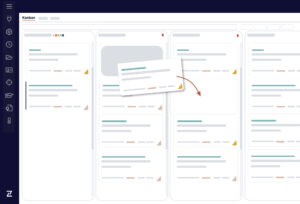
Why are deadlines a cause of stress?
Deadlines allow teams to focus on the certification at hand. Yet, these guiding lights cause a huge amount of stress. What can we do to turn deadlines into friends, in the Testing, Inspection and Certification (TIC) industry?
Read more below ->
Deadlines on the TIC industry
Your certification manager is entering your office without an appointment. You can tell from his face and tone of voice he is frustrated about the complete process. He keeps on giving examples of what goes wrong: overdue audits, missed NC follow ups, just to late re-certification and endless complaints from customers about their experience with your organization and so on and so on. He doesn’t know where to start and how to improve, he is predicting heavy penalties.
But you don’t have time to respond as your meeting about internal training for personal education points is about to start. What seemed so simple is becoming a nightmare process.

The TIC industry allows businesses to publically prove that their products are compliant to the required standard within their industry. You need to manage a strict certification protocol and perform surveillance audits within given time frames to maintain certifications and be safe in the knowledge that they have a high-quality product.
These timeframes – while they should be a source of reassurance – quickly become a source of stress when there’s an unknown amount of work and time required to hit them.
An unknown amount of work? We thought audits were supposed to be methodical projects?
Single deadlines are magnified by the fact that there’s never truly one deadline. The deadline for certification is apparent. But within that process are deadlines for outstanding ‘non-conformities’, follow up, reporting and many more.
Even responding to a client’s email has a deadline, whether a polite formality or an operational KPI.
Managing all of these deadlines is a serious mental burden. But juggling these requirements can’t be the only way. How do you keep deadlines in check and avoid causing burnout, expired certificates and losing clients?
Deadline management realities & non-conformities
You need to keep reality in check when it comes to deadlines. Certification Bodies work on two principles: single deadlines and action frequencies.
These pre-known and repeatable actions should be a scheduling dream, with everything fitting into neat time frames. But in reality, audits, outstanding non-conformities and complex follow-up actions all have an unpredictable level of complications.
These complications contribute to a near endless list of things to keep track of. And when all deadlines are related to each other, they can snowball, leading to hefty penalties. Penalties, where a revoked or suspended certificate, can impact livelihoods in the medical device or food standards industries.

A process in the life of an auditor
Auditors live and breathe the processes and deadlines of an audit. To kick off an audit, they’ll first follow up on outstanding non-conformities. They’ll need to understand the status of those non-conformities and differing timelines for each.
Auditors need to rotate after a number of audits, contract auditors could be unavailable, or your own staff could be leaving. As a result, there’s a strong chance that the surveillance audit is being carried out by a different auditor. Preparing an audit triggers an endless search for documents, reports and non-conformity files; most of the time archived in a personal email box.
Each day the auditor will conduct a call for these documents, and each morning they’ll arrive to find different notes on their desk and missed calls. This process is complex, full of regulation and is subject to individuals responding in unknown time frames. Not to mention the stress of deadlines for last minute scheduled audits.
The scheduler and client
The scheduler needs to keep track of all audit time windows and align them with the client’s availability and or production moments. So it’s often ironic that just when the scheduler has optimized the planning, the first cancellation comes in due to bad weather, postponed production or any other excuse. And the process starts all over again.
In large organisations with multiple regulations, clients also need to manage non-conformities from different standards and Certification Bodies. In this case, they might only share non-conformities in a final report or a separate email. So, how can Certification Bodies be assured they’ve received everything before starting the surveillance or recertification audit?
The list of things to keep track of is endless, and more significant ‘day-to-day’ issues often swallow up smaller tasks with varying status’ and deadlines. So the auditor, the scheduler and the client are all left wondering who did what, when, and where.

The decentralized dealer of deadline troubles
These problems lie in a decentralized data system. The auditor, scheduler, and client operate in separate systems and need to transfer data between each.
These point solutions and loose checklists become an even more significant challenge when you’re trying to collate data for multiple certifications simultaneously. And even if you can tie all the data together in time for the deadline, the chances are that doing so across various systems costs lots of human and additional software resources.
Not sure if you use a decentralized data system or point solutions? Read our blog about point solutions.
The compounding impact of a missed deadline
Regardless of what we’ve said previously, missing a single audit is not the end of the world. Organizations usually try to submit certifications before the actual expiry point, and often a non-conformity follow-up deadline can be pushed and done later.
But continual push-backs cause knock-on problems across other operations, and the client may begin to question your efficiency. After all, you’re supposed to be the compliance expert. If you can’t stick to your promises, who says you’ll audit theirs properly?
Accreditation Bodies look carefully at timeliness. If your organisation gets labelled ‘untrustworthy’ or ‘slow’, it is hard to change this perspective.
The solution to ‘the deadline problem’
Communication is key, but wouldn’t it be great if you never had to let a client know you’ll miss a deadline again?
A well-integrated IT system can take on a lot of the work, and therefore stress, associated with deadlines.
Loose, single-action, or point solutions are useful for specific activities, but they need more input to move data between them. Even automating data transfer between these systems requires maintenance and risks downtime.
Meanwhile, an integrated solution for acquisition, quotes, planning, execution, invoicing and certifications keeps data in one place. The software can call each internal module, managing a timely follow-up of all audits, non-conformities and certificate renewals. A well-designed system can even reference multiple data points against a set of requirements to validate if an action needs to be completed by the auditor.
Finally, with a built-in client portal, you can give clients their live-data dashboard, monitor communication, and send them reminders for their activities.
Zertic offers all of these modules in a single solution to reduce the stress deadlines bring. Click here to read more about our processes or request a demo of the application.




